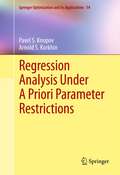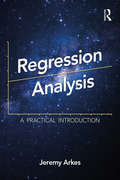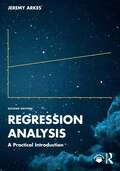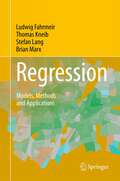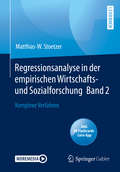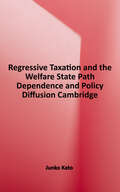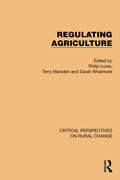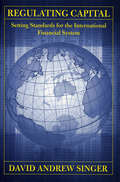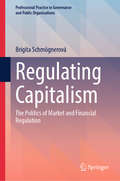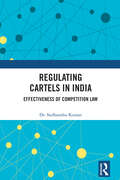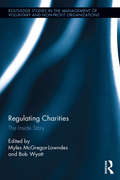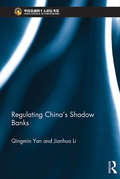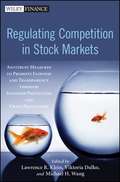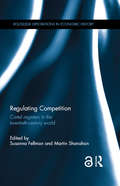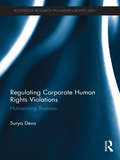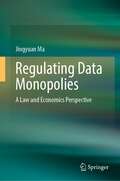- Table View
- List View
Registration Methods for the Small Museum (American Association for State and Local History)
by Daniel B. Reibel Deborah Rose Van HornRegistration Methods for the Small Museum has been the definitive guide to registration methodology for small museums since 1978. The book covers all aspects of the registration process and provides practical solutions for the small museum professional in a concise, readable manner. This step-by-step guide begins with developing policy and takes the reader through acquisition, numbering, accessioning, documentation, loans, and deaccessioning. It is a great introduction to both manual and computer systems and can help those that are unfamiliar with museum registration systems learn more about their collections. The fifth edition updates the handbook to fit the registration systems in today’s small museums and provides additional forms that weren’t in previous editions of the book. <p><p>Features include: <p>•Easy to understand forms and templates <p>•Overviews of both manual and computer registration systems <p>•Overview of the acquisition process <p>•Overview of the cataloging process <p>•Overviews of museum loans <p>•Examples of a collections policy and registration manual for a small museum <p>•Guidance for small museums on how to create a new registration system or interpret the one they have
Regoverning Markets: A Place for Small-Scale Producers in Modern Agrifood Chains? (Gower Sustainable Food Chains Series)
by Bill Vorley, Andrew Fearne and Derek RayThe internationalisation of food retailing and manufacturing that has swept through the agri-food system in industrialised countries is now moving into middle- and low-income countries with large rural populations, causing significant institutional changes that affect small producer agriculture and the livelihoods of rural communities the world over. Farmers and policy-makers are struggling to keep up with the wave of new demands being made on their supply chains by food manufacturers and retailers. In the process, new questions and challenges are arising: Can small-scale farmers organise to meet the demands of corporate giants? Should governments liberalise Foreign Direct Investment in the retail sector and expose numerous small shops to competition from multinationals? Can distribution systems be adapted to make markets work better for the poor? This book offers a contemporary look at what happens when the modernisation of food supply chains comes face to face with the livelihoods of rural and poor people. The authors are drawn from eighteen countries participating in the 'Regoverning Markets' programme, which aims to not only improve our understanding of the way modernisation and re-structuring of food supply chains is affecting food production and distribution systems, but also identify best-practice in involving small-scale producers in supermarket supply chains, and ascertain the barriers to inclusion which need to be removed. The book is aimed primarily at academics but will also appeal to practitioners in developing countries, civil servants, policy-makers and NGOs.
Regression Analysis
by David E. BellProvides a relatively simple introduction to multivariate regression analysis.
Regression Analysis Under A Priori Parameter Restrictions
by Pavel S. Knopov Arnold S. KorkhinThis monograph focuses on the construction of regression models with linear and non-linear constrain inequalities from the theoretical point of view. Unlike previous publications, this volume analyses the properties of regression with inequality constrains, investigating the flexibility of inequality constrains and their ability to adapt in the presence of additional a priori information The implementation of inequality constrains improves the accuracy of models, and decreases the likelihood of errors. Based on the obtained theoretical results, a computational technique for estimation and prognostication problems is suggested. This approach lends itself to numerous applications in various practical problems, several of which are discussed in detail The book is useful resource for graduate students, PhD students, as well as for researchers who specialize in applied statistics and optimization. This book may also be useful to specialists in other branches of applied mathematics, technology, econometrics and finance
Regression Analysis: A Practical Introduction
by Jeremy ArkesWith the rise of "big data," there is an increasing demand to learn the skills needed to undertake sound quantitative analysis without requiring students to spend too much time on high-level math and proofs. This book provides an efficient alternative approach, with more time devoted to the practical aspects of regression analysis and how to recognize the most common pitfalls. By doing so, the book will better prepare readers for conducting, interpreting, and assessing regression analyses, while simultaneously making the material simpler and more enjoyable to learn. Logical and practical in approach, Regression Analysis teaches: (1) the tools for conducting regressions; (2) the concepts needed to design optimal regression models (based on avoiding the pitfalls); and (3) the proper interpretations of regressions. Furthermore, this book emphasizes honesty in research, with a prevalent lesson being that statistical significance is not the goal of research. This book is an ideal introduction to regression analysis for anyone learning quantitative methods in the social sciences, business, medicine, and data analytics. It will also appeal to researchers and academics looking to better understand what regressions do, what their limitations are, and what they can tell us. This will be the most engaging book on regression analysis (or Econometrics) you will ever read!
Regression Analysis: A Practical Introduction
by Jeremy ArkesThis thoroughly practical and engaging textbook is designed to equip students with the skills needed to undertake sound regression analysis without requiring high-level math. Regression Analysis covers the concepts needed to design optimal regression models and to properly interpret regressions. It details the most common pitfalls, including three sources of bias not covered in other textbooks. Rather than focusing on equations and proofs, the book develops an understanding of these biases visually and with examples of situations in which such biases could arise. In addition, it describes how ‘holding other factors constant’ actually works and when it does not work. This second edition features a new chapter on integrity and ethics, and has been updated throughout to include more international examples. Each chapter offers examples, exercises, and clear summaries, all of which are designed to support student learning to help towards producing responsible research. This is the textbook the author wishes he had learned from, as it would have helped him avoid many research mistakes he made in his career. It is ideal for anyone learning quantitative methods in the social sciences, business, medicine, and data analytics. It will also appeal to researchers and academics looking to better understand regressions. Additional digital supplements are available at: www.youtube.com/channel/UCenm3BWqQyXA2JRKB_QXGyw.
Regression Modeling with Actuarial and Financial Applications
by Edward W. FreesStatistical techniques can be used to address new situations. This is important in a rapidly evolving risk management and financial world. Analysts with a strong statistical background understand that a large data set can represent a treasure trove of information to be mined and can yield a strong competitive advantage. This book provides budding actuaries and financial analysts with a foundation in multiple regression and time series. Readers will learn about these statistical techniques using data on the demand for insurance, lottery sales, foreign exchange rates, and other applications. Although no specific knowledge of risk management or finance is presumed, the approach introduces applications in which statistical techniques can be used to analyze real data of interest. In addition to the fundamentals, this book describes several advanced statistical topics that are particularly relevant to actuarial and financial practice, including the analysis of longitudinal, two-part (frequency/severity), and fat-tailed data. Datasets with detailed descriptions, sample statistical software scripts in "R" and "SAS," and tips on writing a statistical report, including sample projects, can be found on the book's Web site: http://research. bus. wisc. edu/RegActuaries.
Regression: Models, Methods and Applications
by Brian Marx Ludwig Fahrmeir Stefan Lang Thomas KneibThe aim of this book is an applied and unified introduction into parametric, non- and semiparametric regression that closes the gap between theory and application. The most important models and methods in regression are presented on a solid formal basis, and their appropriate application is shown through many real data examples and case studies. Availability of (user-friendly) software has been a major criterion for the methods selected and presented. Thus, the book primarily targets an audience that includes students, teachers and practitioners in social, economic, and life sciences, as well as students and teachers in statistics programs, and mathematicians and computer scientists with interests in statistical modeling and data analysis. It is written on an intermediate mathematical level and assumes only knowledge of basic probability, calculus, and statistics. The most important definitions and statements are concisely summarized in boxes. Two appendices describe required matrix algebra, as well as elements of probability calculus and statistical inference.
Regressionsanalyse in der empirischen Wirtschafts- und Sozialforschung Band 2: Komplexe Verfahren
by Matthias-W. StoetzerDieses Lehrbuch ist der Folgeband zu „Regressionsanalyse in der empirischen Wirtschafts- und Sozialforschung Band 1“. Es richtet sich an Studierende und Wissenschaftler, die im Rahmen einer Forschungsarbeit Daten analysieren oder vorhandene empirische Publikationen auswerten müssen. Regressionsanalysen stellen die wichtigsten Verfahren zur Untersuchung empirischer Fragestellungen in den Wirtschafts- und Sozialwissenschaften dar. Im Unterschied zu anderen ökonometrischen oder statistischen Lehrbüchern verzichtet der Autor auf abschreckende mathematische Ausführungen. Alle Aspekte werden verbal und grafisch erläutert. Die Kapitel sind so aufgebaut, dass ein selbständiges Studium problemlos möglich ist. Lesende werden Schritt für Schritt in komplexere Verfahren eingeführt.Dabei sind sämtlichen Kapiteln die wichtigsten Lernziele und Schlüsselbegriffe vorangestellt. Jedes Kapitel schließt mit einer Reihe von Übungsaufgaben einschließlich Lösungen. Praxisorientiert werden alle Regressionsverfahren und Tests anhand der Statistikprogramme SPSS und Stata sowie mittels Screenshots erklärt. Zusätzliche Fragen per AppLaden Sie die Springer Nature Flashcards-App kostenlos herunter und nutzen Sie exklusives Zusatzmaterial, um Ihr Wissen zu prüfen.
Regressive Taxation and the Welfare State: Path Dependence and Policy Diffusion (Cambridge Studies in Comparative Politics)
by Junko KatoPolitical economists have viewed large public expenditures as a product of leftist government and the expression of a stronger representation of labor interest. The formation of governments' funding bases is a topic that has not been thoroughly explored, and this book sheds important new light on the issue of taxes and welfare. Beginning with a clarification of the development of postwar tax policies in industrial democracies, Junko Kato finds that the differentiation of tax revenue structure is path-dependent upon the shift to regressive taxation. Kato challenges the conventional belief that progressive taxation leads to large public expenditures in mature welfare states.
Regtech at HSBC
by James Weber Jonas Heese Aiyesha DeyMark Cooke, Global Head of Operational Risk, needed to decide between a traditional regulatory control system and a new regtech system to manage non-financial risks. Non-financial risks failures such as money laundering and tax evasion had cost HSBC billions of dollars in fines and settlements over the previous decade. In response, HSBC had hired thousands of risk and compliance staff and invested billions in traditional control systems. Cooke, however, could not be sure HSBC's traditional methods were sufficient and he was worried they were not sustainable. Cooke recently ran a pilot test of a regtech solution that promised to warn of problem areas in advance, and do so at a much lower cost than traditional systems. The regtech solution provider was a small startup and the technology was not fully developed. Cooke wondered how much he could trust a technology from a startup company with a handful of employees and almost no revenue to meet the needs of a world-leading bank with global operations.
Regulating Agriculture (Critical Perspectives on Rural Change #5)
by Sarah Whatmore Philip Lowe Terry MarsdenOriginally published in 1994, this volume brings together a set of essays reflecting the complex political, social and institutional problems encountered by modern states in seeking to manage their agricultural sectors. Drawing on different national and international viewpoints, the essays present original analyses of agricultural regulation in a comparative context. The aspects covered include the roots of the post-war food order; the roles of corporatism, agribusiness and technological change, the challenge of de-regulation and environmental reforms, the introduction of market principles and mechanisms into centrally planned economies and the efforts to forge a new order in international trade.
Regulating Banks in Central and Eastern Europe
by Aneta SpendzharovaHow do bank supervisors strike a balance between market self-regulation and pro-active regulatory intervention? This book investigates the choice of banking supervision approach in four European Union member states from Central and Eastern Europe - Bulgaria, Estonia, Hungary, and Slovenia - after their transition to democracy and market economy.
Regulating Business for Peace
by Jolyon FordThis book addresses gaps in thinking and practice on how the private sector can both help and hinder the process of building peace after armed conflict. It argues that weak governance in fragile and conflict-affected societies creates a need for international authorities to regulate the social impact of business activity in these places as a special interim duty. Policymaking should seek appropriate opportunities to engage with business while harnessing its positive contributions to sustainable peace. However, scholars have not offered frameworks for what is considered 'appropriate' engagement or properly theorised techniques for how best to influence responsible business conduct. United Nations peace operations are peak symbols of international regulatory responsibilities in conflict settings, and debate continues to grow around the private sector's role in development generally. This book is the first to study how peace operations have engaged with business to influence its peace-building impact.
Regulating Capital: Setting Standards for the International Financial System
by David Andrew SingerFinancial instability threatens the global economy. The volatility of capital movements across national borders has led many observers to argue for a reformed "global financial architecture," a body of consistent rules and institutions to prevent financial crises. Yet regulators have a decidedly mixed record in their attempts to create global standards for the financial system. David Andrew Singer seeks to explain the varying pressures on regulatory agencies to negotiate internationally acceptable rules and suggests that the variation is largely traceable to the different domestic political pressures faced by regulators. In Regulating Capital, Singer provides both a theory of the effects of domestic pressures on international regulation and a detailed analysis of regulators' attempts at international rulemaking in banking, securities, and insurance. Singer addresses the complexities of global finance in an accessible style, and he does not turn away from the more dramatic aspects of globalization; he makes clear the international implications of bank failures and stock-market crashes, the rise of derivatives, and the catastrophic financial losses caused by Hurricane Katrina and the events of September 11.
Regulating Capitalism: The Politics of Market and Financial Regulation (Professional Practice in Governance and Public Organizations)
by Brigita SchmögnerováInspired by Karl Polanyi's assertion that a self-adjusting market cannot persist without undermining the human and natural fabric of society, this book explores the critical role of market regulation in sustaining capitalism. It defends the thesis that "regulation is saving capitalism," while acknowledging the cyclical nature of market regulation: periods of regulation are often followed by waves of deregulation, creating &“a swinging pendulum&” phenomenon. Combining approaches from political economy and history of regulatory approaches in theory and practice, the book investigates the sensitivity of the pendulum to its driving forces incl. &“material causes,&” changes in a political power, competing interests, etc. It verifies the capacity of two main theories of regulation to explain this cyclical phenomenon. Part I. of the book examines, with a specific focus on regulation in the European Union, main goals of regulation, the redistributive effects of regulation, regulatory capture by vested interests including &“international policing mechanisms,&” risks of regulatory failure, the dangers of overregulation, and limits of self-regulation as well as questions the efficacy of the Better Regulation agenda. Part II. provides an in-depth analysis of financial regulation, it explores the key endogenous factors and some exogenous factors of financial instability (like COVID-19, climate change) which underline the need to regulate financial capitalism in order to maintain financial stability without jeopardising innovation, growth and competitiveness. It discusses the rapid evolution of European financial regulation since the 2007/8 financial crisis, including efforts to complete the European Banking Union, advance the European Capital Market, and promote Sustainable finance. Drawing on the author's scholarly as well as practical experiences as the former Deputy Prime Minister (1994) and Finance Minister (1998-2002) of the Slovak Republic, this book is written for both professionals in regulatory agencies and government institutions, as well as scholars with an interest in regulatory issues and economic policy.
Regulating Capitalism?: The Evolution of Transnational Accounting Governance
by Jochen Zimmermann Jörg R. WernerThis book charts the regulatory changes at the heart of capitalist economies; the financial reporting on financial markets. It is a unique contribution interconnecting issues both of contemporary political science and accounting research. The book contains in-depth descriptions of regulatory settings (and changes) in six countries: Canada, France, Germany, Japan, the United Kingdom and the United States and aims to takes a close look at drivers of change such as crises and globalization. The book also links these drivers of change with moderating institutional structures such as the legal and financial systems, but also the welfare states in place. Taken together, it shows how a trend to more transnationalization in accounting emerges but also its likely limits.
Regulating Cartels in India: Effectiveness of Competition Law
by Sudhanshu KumarThis book presents a comprehensive assessment of anti-cartel enforcement and investigative procedures in India. It makes a case for enhanced sanctions for cartel conduct in India. Cartels are considered the most pernicious violation of competition law, referred to as "cancer to the free market economy". While competition laws in most jurisdictions prescribe strict sanctions against cartels, Indian Competition Law provides only civil penalties, with an upper ceiling for proven cartel conduct. This volume assesses the effectiveness of anti-cartel enforcement of the Competition Commission of India (CCI). It explores investigative procedures of the CCI through multiple qualitative and quantitative indicators and the extent to which enforcement of anti-cartel laws in India has led to cartel deterrence. Further, it also examines the priorities and processes of the CCI in terms of anti-cartel enforcement, their sanctioning mechanism and their dependency of computation of penalty on varied factors. Featuring detailed case law studies and engaging data, this book will be an essential read for students and researchers of law and legal studies, competition law, corporate law, intellectual property law, and business law.
Regulating Charities: The Inside Story (Routledge Studies in the Management of Voluntary and Non-Profit Organizations)
by Myles McGregor-Lowndes Bob WyattIn this volume charity commissioners and leading charity policy reformers from across the world reflect on the aims and objectives of charity regulation and what it has achieved. Regulating Charities represents an insider’s review of the last quarter century of charity law policy and an insight for its future development. Charity Commissioners and nonprofit regulatory agency heads chart the nature of charity law reforms that they have implemented, with a ‘warts and all’ analysis. They are joined by influential sector reformers who assess the outcomes of their policy agitation. All reflect on the current state of charities in a fiscally restrained environment, often with conservative governments, and offer their views on productive regulatory paths available for the future. This topical collection brings together major charity regulation actors, and will be of great interest to anyone concerned with contemporary third sector policy-making, public administration and civil society.
Regulating China's Shadow Banks (China Perspectives)
by Qingmin Yan Jianhua LiChina’s shadow banking has been a top issue in the past few years. Scholars, policymakers, and professionals around the world are seeking deeper insight into the subject, and the authors had unique insight into the sector through their positions high up in the regulatory apparatus. "Regulating China’s Shadow Banks" focuses on the regulation of shadow banks in China and provides crucial information to demystify China’s shadow banking and associated regulatory challenges. This book defines "shadow banking" in the Chinese context, analyzes the impact of shadow banking on the Chinese economy, includes a full-scale analysis on the current status of Chinese financial regulation, and provides valuable advice on the regulation of China’s shadow banks.
Regulating Competition in Stock Markets
by Lawrence Klein Michael Wang Viktoria DalkoA guide to curbing monopoly power in stock marketsEngaging and informative, Regulating Competition in Stock Markets skillfully analyzes the impact of the recent global financial crisis on health and happiness, and uses this opportunity to put regulatory systems in perspective. Happiness is lost because of emotional and physical health deterioration resulting from the crisis. Therefore, the authors conclude that financial crisis prevention should be the focus of public policy.This book is the most comprehensive study so far on potential risks to the stock market, especially various forms of market manipulation that lead to mania and eventual crisis. Based on litigation cases from international stock markets, and borrowing multidisciplinary findings in the fields of finance, economics, accounting, media studies, criminology, legal studies, psychology, and medicine, this book is the first to provide thorough micro-level regulatory proposals rooted in financial reality. By focusing on securities trading, they apply antitrust measures to limiting monopolistic power that is used for the manipulation of investors' perception and monopolistic profit. These proposals are quantifiable, adjustable, inexpensive, and can be easily implemented by any securities regulating agency for real-time oversight and daily operations.The recommendations found here are intended to improve the fairness and transparency of the financial markets, thereby perfecting the market competition, protecting investors, stabilizing the market, and preventing crisesExplores how avoiding crises can to contribute to a more scientific, health aware, and civilized economic and social developmentWritten by a team of authors who have extensive experience in this dynamic field, including Nobel Laureate Lawrence R. KleinSince the founding of the first, organized stock exchange in Amsterdam 400 years ago, no systematic economic research results on stock markets have been implemented in stock market regulation around the world. Regulating Competition in Stock Markets aims to fill this void.
Regulating Competition: Cartel registers in the twentieth-century world (Routledge Explorations in Economic History)
by Susanna Fellman; Martin ShanahanCartels, trusts and agreements to reduce competition between firms have existed for centuries, but became particularly prevalent toward the end of the 19th century. In the mid-20th century governments began to use so called ‘cartel registers’ to monitor and regulate their behaviour. This book provides cases studies from more than a dozen countries to examine the emergence, application and eventual decline of this form of regulation. Beginning with a comparison of the attitudes to regulation that led to monitoring, rather than prohibiting cartels, this book examines the international studies on cartels undertaken by the League of Nations before World War II. This is followed by a series of studies on the context of the registers, including the international context of the European Union, and the importance of lobby groups in shaping regulatory outcomes, using Finland as an example. Section two provides a broad international comparison of several countries’ registers, with individual studies on Norway, Australia, Japan, Germany, Sweden and the Netherlands. After examining the impact of registration on business behaviour in the insurance industry, this book concludes with an overview of the lessons to be learnt from 20th century efforts to regulate competition. With a foreword by Harm Schroter, this book outlines the rise and fall of a system that allowed nations to tailor their approach to regulating competition to their individual circumstances whilst also responding to the pressures of globalisation that emerged after the Second World War. This book is suitable for those who are interested in and study economic history, international economics and business history. Chapter 10 of this book is freely available as a downloadable Open Access PDF at http://www.taylorfrancis.com under a Creative Commons Attribution-Non Commercial-No Derivatives (CC-BY-NC-ND) 4.0 license.
Regulating Corporate Human Rights Violations: Humanizing Business (Routledge Research in Human Rights Law)
by Surya DevaDespite the continuous addition of regulatory initiatives concerning corporate human rights responsibilities, what we witness more often than not is a situation of corporate impunity for human rights abuses. The Bhopal gas leak – examined as a site of human rights violations rather than as a mass tort or an environmental tragedy – illustrates that the regulatory challenges that the victims experienced in 1984 have not yet been overcome. This book grapples with and offers solutions to three major regulatory challenges to obligating companies to comply with human rights norms whilst doing business, and asks; why companies should adhere to human rights, what these responsibilities are, and how to ensure that companies comply with their responsibilities. Building on literature in the fields of law, human rights, business ethics, management, regulation and philosophy, this book proposes a new ‘integrated theory of regulation’ to overcome inadequacies of the existing regulatory framework in order to humanize business. This book will be of interest to scholars, students, researchers, policy makers and human rights activists working in the fields of Law, Business and Human Rights.
Regulating Data Monopolies: A Law and Economics Perspective
by Jingyuan MaThis book analyzes the business model of enterprises in the digital economy by taking an economic and comparative perspective. The aim of this book is to conduct an in-depth analysis of the anti-competitive behavior of companies who monopolize data, and put forward the necessity of regulating data monopoly by exploring the causes and characteristics of their anti-competitive behavior. It studies four aspects of the differences between data monopoly and traditional monopolistic behavior, namely defining the relevant market for data monopolies, the entry barrier, the problem of determining the dominant position of data monopoly, and the influence on consumer welfare. It points out the limitations of traditional regulatory tools and discusses how new regulatory methods could be developed within the competition legal framework to restrict data monopolies. It proposes how economic analytical tools used in traditional anti-monopoly law are facing challenges and how competition enforcement agencies could adjust regulatory methods to deal with new anti-competitive behavior by data monopolies.



